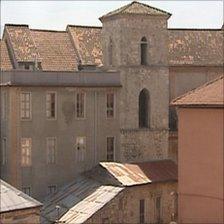Hair-in-hand murder: The Italian link
- Published
High in the hills East of Salerno, the ancient town of Potenza is Italy's loftiest regional capital.
Old buildings and modern apartment blocks sprawl across the hillsides so steep that the local council has provided lifts, and what is reputedly the longest escalator in Europe, to enable residents to go about their daily lives.
Just off the main square, a high-arched doorway marks the main entrance of the church of the Most Holy Trinity.
Here, on a September morning in 1993 - nine years before Heather Barnett's brutal murder in Bournemouth - 16-year-old Elisa Claps waited to meet Danilo Restivo.
Chatted 'behind altar'
She knew him well, and perhaps felt sorry for him. After all, he had asked her to go out with him and she had always said no.
So she told her parents she was going to mass and met Restivo in a quiet street behind the church.

Elisa Claps met Danilo Restivo at the church of the Most Holy Trinity
We only have his word on what happened next. He said they went into the church and chatted in an area behind the altar.
Then Elisa had left, safe and well. Which is what Restivo told her brother, Gildo, later the same day when the family phoned, worried that she had not returned home.
Alarm bells were still ringing in Gildo's mind when he arrived to look for his sister at the church.
He searched the building, but a locked door prevented him climbing to the roof space above, where Elisa's body lay undiscovered.
Everyone in Potenza remembers the police operation which followed - the story of the missing girl spread to every corner of Italy and far beyond.
And yet, according to the Claps family, for more than 17 years, and despite a number of tip-offs, the one place where Elisa was last seen was never thoroughly examined.
'Risk to society'
"We've lived through years of hell," Gildo Claps told the BBC, "I'm sure that if things had been done more carefully, Elisa's body would have been found that same day."
Sitting in a street cafe near the church, local journalist Fabio Amendolara told us about a confidential case review carried out by the police in 2008, six years after Heather Barnett died.
It revealed that Danilo Restivo, now 39, had been regarded as a risk to society since he was a teenager.
He had shown violent tendencies, had been reported for stalking women, and was already indulging in the hair cutting fetish which he continued in the UK.
The Claps family are among those who believe that if the police had acted more effectively on that intelligence, Heather Barnett might still be alive.
"Those two children would still have their mother," Gildo said.
"That hurts me deeply. I said many times 'stop him' because I was convinced he would strike again."
In a grimy back street, near a closed down cinema, two plaques commemorate the tragically short life of Elisa Claps.
Her mummified remains were finally discovered in March 2010 in the church roof 17 years after she vanished.
Restivo is expected to face demands for his extradition within weeks.
- Published29 June 2011
- Published29 June 2011
- Published29 June 2011